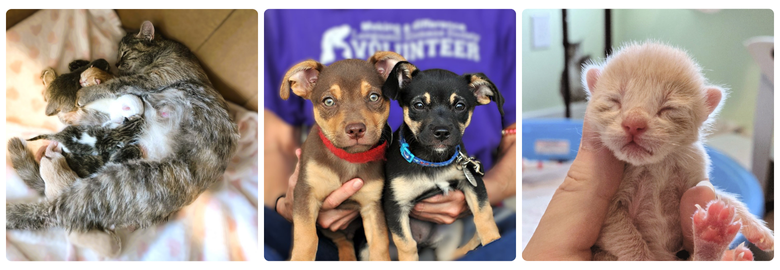About Foster Care at Longmont Humane Society
Longmont Humane Society’s foster program supports hundreds of animals each year, and many volunteers find it to be one of the most rewarding ways to make a difference. Fostering offers a hands-on opportunity to deepen your understanding of animal health and behavior while witnessing the life-changing impact of your care. Plus, you’ll earn the heartfelt gratitude of both our staff and the animals you help.

Animals sent to foster homes come from special circumstances. They may need medical care, additional socialization and handling, or just a place to grow up healthy and strong. These especially vulnerable pets need a safe home environment until they’re ready for adoption. Our foster care volunteers are responsible for saving the lives of hundreds of shelter animals each year by caring for them temporarily in their homes.
What types of animals need foster care?
- Bottle babies
- Animals under 8 weeks of age who need a place to grow big and strong
- Injured or ill animals who need a quiet home to relax and recover in (kennel cough, upper respiratory infection, surgery recovery)
- Animals of all ages needing socialization
- Pregnant/Mother dogs & cats with litters
- Animals stressed by the shelter environment that need a break
- “Unicorn Fosters” – These are dogs with special needs for just the right foster home – maybe a home without other pets or a yard with a good fence, etc.
- Safe Keep is a program to provide temporary housing for owned animals whose people are experiencing a crisis.
As a foster volunteer, you select the type of foster care you can provide. If you can only foster one animal per year, that’s one more life saved!
How Do I Become A Foster Volunteer?
- No experience necessary!
- You must be at least 18 years of age to foster.
- Everyone in the household must be in agreement with your decision to foster.
- A home visit is required prior to your first foster. (Required annually by the State of Colorado)
- Complete and submit our Foster Care Application.
Questions about foster care? Please email foster@longmonthumane.org or call 303.772.1232 ext. 278
Frequently Asked Questions:
- How much does it cost to foster an animal?
- We provide all veterinary care, food, and necessary supplies. If you are able to donate any of the non-veterinary supplies to help offset costs, all purchases are considered a donation and are tax deductible.
- Do I have to respond to every foster request?
- It is entirely up to you how, what, and when you foster. If you can only foster one pet a year that’s one more pet saved. Fostering is meant to be a fun and rewarding experience, so only take on what you are comfortable with.
- How long is the average foster period?
- Foster periods vary depending on the age, needs, and other specifics about the animal. Generally, most foster situations range from 2 weeks up to 2 months. We do our best to to note what the expected foster period will be for each animal. If at any time a foster animal is not working out, or you need to return an animal for any reason, you are always welcome to bring an animal back to the shelter.
- What animals are available for foster?
- While our greatest need for fosters comes with Kitten Season, (April – November), we also have a need for foster homes for dogs of all ages. Some may need some time out of the shelter to test a manageable behavior issue, de-stress from shelter life, or recover from a surgery or illness. There are also adult cats and small mammals that may need some time out of the shelter as well. You, as the foster hero, decide how, what, and when you foster.
- Can I adopt an animal I foster?
- Of course! We affectionately call these adoptions “Foster Fails.” It can be very easy to become attached to your foster animals. We do encourage you to return at least one foster back to the shelter for adoption so that you experience the joy of seeing your charge go on to live a happy life with another family- this makes it easier to continue fostering as you will not feel the need to adopt every animal you take in. Foster heroes receive a 20% discount on adoption fees.
- What if my foster animal isn’t working out?
- If you’re unable to continue fostering for any reason, it’s absolutely okay to bring the animal back. Conflicts with your own pets or unexpected challenges – like a litter of kittens turning out to be more work than you expected – can happen to anyone. Don’t feel bad! Every experience helps us learn more about the animal.
- What do I do if there is an emergency with my foster animal?
- A staff member is on call 24/7 to assist with any foster animal emergencies – you’re never alone. The emergency number, which stays the same, will be provided with each foster and should be used only for true emergencies. The shelter is open daily, with veterinary staff available every day to support you with any health concerns.
Ready to explore further?
Current Foster Care Volunteer Resources
- Foster Feeding Guidelines – Cat/Kitten
- Foster Feeding Guidelines – Dog/Puppy
- Guide to Raising Orphan Kittens
- Bottle Baby Information and Troubleshooting Guide
- Transitioning Bottle Babies to Slurry
- Foster Animal Health Sheet
- Medication Tracking